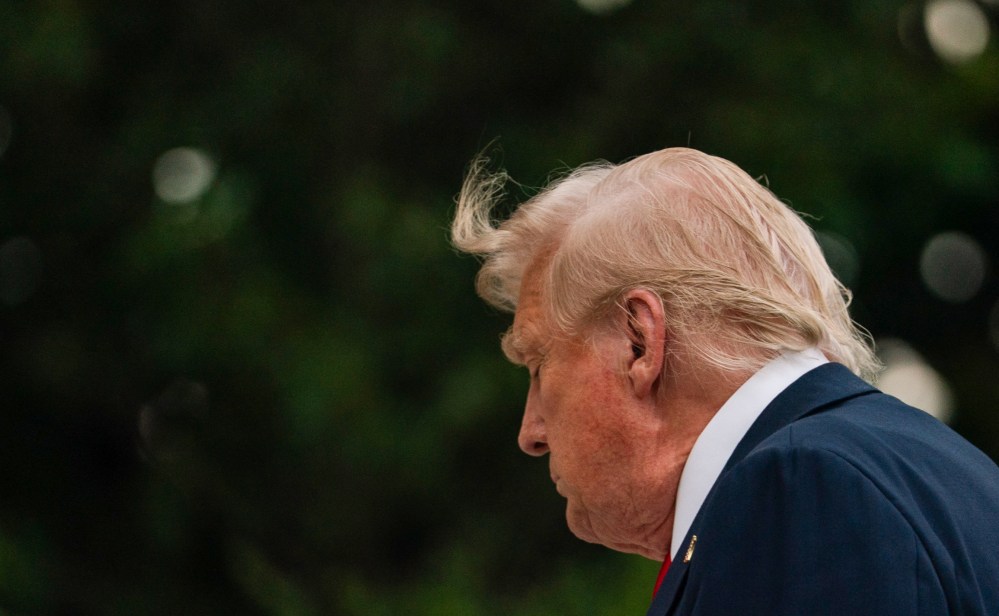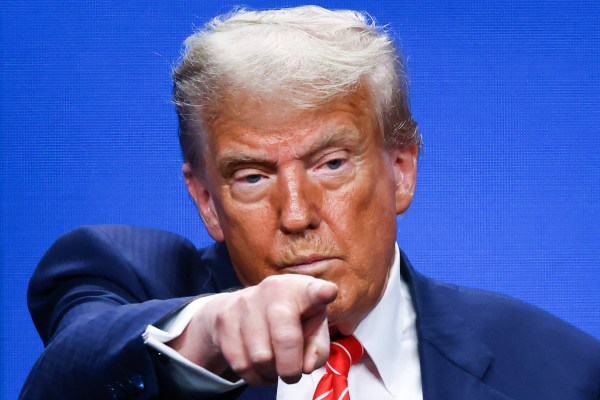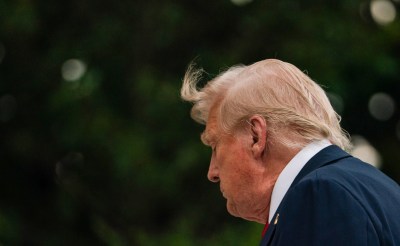"We have no government armed with power capable of contending with human passions unbridled by morality and religion,” John Adams famously wrote. “Avarice, ambition, revenge or gallantry would break the strongest cords of our Constitution as a whale goes through a net. Our Constitution is designed only for a moral and religious people. It is wholly inadequate for any other.”
Adams was speaking about the general pattern of our government, but what he wrote is especially true of the presidency. At the time the office was being created, there was some concern among the framers about whether they were creating a chief executive that was too weak, insufficiently grand—too republican, in essence, though as far as I know none of them put it exactly that way, too common and too popular to stand eye-to-eye with the kings and emperors who would be his peers. Adams himself made a number of ridiculous (and justly ridiculed) proposals for forms of presidential address: His Elective Majesty, His Mightiness, High Highness, the President of the United States of America and the Protector of their Liberties, etc. A potentially weak presidency was very much a concern for them.
Oops.
As a non-paying reader, you are receiving a truncated version of Wanderland. You can read Kevin's full newsletter by becoming a member here.
The genius of the American founding is that our constitutional architecture takes account of the actual facts of human nature—including that avarice and ambition that Adams wrote about—rather than basing our system of government on some romantic ideal about what men could be if only we pushed them in the right direction. (At the point of a bayonet or under threat of guillotine if necessary.) While subsequent revolutionists from France to Russia to Iran tried to remake the whole of life along utopian lines, the American Founders were content simply to build an artfully designed apparatus of national government—in their modesty, they found greatness.
But, of course, nobody gets it right every time or in every jot and tittle. Adams has (in my mind, at least) a fair claim on being the true father of American political conservatism, but he and many of his colleagues were naïve (or maybe they just made the wrong bet) when it came to the matter of the chief executive, his powers, his prerogatives, and his stature.
Why did they get it so wrong?
There is a reason beyond politics that government under the domination of a single paternal figure has been the norm across so many radically different societies for millennia. The greatest English contribution to liberty was the notion that even the king must be subject to the law, and the American Revolution extended that principle by eliminating kings as such and replacing them with a different kind of national father figure who is, in theory, entirely a creature of the law, invested with power not by God’s favor but by the Constitution and by the electors acting as the representatives of the people. But such a singular figure was destined to be something like a king, whatever we called him, and, maybe, something even worse.
Avarice, envy, servility, power worship, the spirit of revenge—the American Founders accounted for these to an admirable degree. They did not account for the diminishing democratic attention span, which grew shorter throughout the 19th century and then radically shorter from the middle of the 20th century through our own time, driven in part by a series of advancements in communications technology, as first radio was added to the arsenal of demagoguery, and then television, and then the Internet. Beyond technology, there is the issue of the gross scale of the American enterprise: 340 million Americans, 130 million or so households, 50 states with governors and legislators of their own, 3,144 counties, nearly 20,000 municipalities, more than 16,000 school districts, etc. Even people who follow politics professionally must specialize, and there are many people who can tell you everything there is to know about the politics of financial regulation in Washington who have no idea what is going on in Austin or Denver or Tallahassee, or with national security or agriculture policy.
The average American citizen has neither the time nor the inclination to follow the comings and goings of the 700 or so people who are closest to the center of our national government: 435 House members, 100 senators, nine Supreme Court justices, the president and the 26 members of the Cabinet, the various key advisers and staffers who help to shape the executive, legislative, and judicial agendas. It is natural—the theater critic in me is tempted to argue that it is inevitable—that the nation’s political attention should be focused on one man and that, as a result of this and in direct contravention of our constitutional design, real power should disproportionately cleave to that man and his office, including the vital sovereign powers (lawmaking, declaring war, ratifying treaties) that are explicitly invested in Congress.
The founding generation escaped the worst consequences of having created an overpowering executive the only way human beings have ever really solved a problem like that: with the aid of good men. They put George Washington into the presidency and successfully relied on Washington’s personal integrity, moral seriousness, patriotism, and republican sensibility not only to keep the presidency in check during his own administration but also to set a controlling example for future presidents. They did not fall into the error that worried T. S. Eliot, “dreaming of systems so perfect that no one will need to be good.” But they did overestimate the supply of good men, just as they underestimated Americans’ proclivity for elevating the other kind. After only a half-dozen excellent-to-pretty-good presidents, the office was in the hands of Andrew Jackson, who was, pace John Yoo, a scoundrel, a demagogue, and a tyrant.
Ups and downs followed.
Eventually, Americans sent Donald Trump, a ridiculous game-show host and quondam pornographer, to the White House in 2016. He subsequently attempted to stage a coup d’état after losing the 2020 election, found himself convicted of a raft of felonies, and conducted himself in the most contemptible and juvenile manner imaginable—and so Americans sent him back to the White House in 2024 and are watching him spend his days trying to explain away the fact that his personal life intersects at several points with an infamous child-sex-trafficking conspiracy. My progressive friends sometimes moan about “normalizing” Trump, but Trump is utterly normal in the way diabetes and rape and war are normal. Not good, but not unexpected.
Trump is part of a very long line of autocrats and caudillos, exemplifying C.S. Lewis’ observation: “How monotonously alike all the great tyrants and conquerors have been.” Trump has now accused one of his predecessors, Barack Obama, of “treason,” based on ... nothing at all that is germane to treason. Trump’s Department of Justice, so called, has opened an investigation into matters related to this supposed treason. The “treason” consists entirely in having been a political opponent of Donald Trump, who also has invented such fanciful legal notions as “presidential harassment,” and who has been emboldened by our Supreme Court’s absolutely idiotic invention of a presidential “immunity” found nowhere in the Constitution. Accusing political critics and rivals of treason is, of course, a strategy typical of tyrants ranging from Caligula to Henry VIII. The notion that the chief is somehow above the law—even to the modest degree contemplated by Chief Justice John Roberts in a decision that Americans likely will regret for generations—is very old stuff, too. That Trump practices these traditions while embracing Neronic vulgarity and the marital values of Henry VIII is simply a new layer of fecal frosting on the same old cake.
When chief executives start accusing their opponents of treason, it is time to throw them out. But how could one trust in the same Americans who were stupid and vicious enough to twice elect the man to suddenly develop sufficient wisdom and patriotism at this late date?
Editor’s note: Kevin D. Williamson is on vacation this week; Wanderland will return in its usual form next week.








Please note that we at The Dispatch hold ourselves, our work, and our commenters to a higher standard than other places on the internet. We welcome comments that foster genuine debate or discussion—including comments critical of us or our work—but responses that include ad hominem attacks on fellow Dispatch members or are intended to stoke fear and anger may be moderated.
With your membership, you only have the ability to comment on The Morning Dispatch articles. Consider upgrading to join the conversation everywhere.